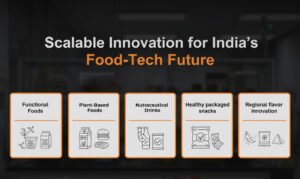India’s food-tech industry is growing quickly, and brands now need to launch healthier, safer, and more innovative food products. With people choosing high-protein snacks, clean-label foods, plant-based meals, and functional drinks, companies must work smarter to stay ahead. This is why smart R&D labs—built with automation, data systems, and modern testing tools—are changing the way Food Product Development happens in India.
These labs help food companies create new products faster, reduce guesswork, improve quality, and bring ideas to the market more quickly than old-style R&D methods.
1. Food Product Development With Automation
Traditional R&D takes time and depends on a lot of manual work. Smart labs speed up the whole process with:
- Automated formulation tools
- Digital recipe storage
- Ingredient modeling tools
- Multiple tests running at the same time
This helps brands finish Food Product Development much quicker, allowing them to launch products—such as millet snacks or protein drinks—before their competitors.
Also learn about: Trends In Food Product Development
2. Data Systems Help Understand Indian Consumer Choices
Smart labs use simple data systems to understand what people in India prefer. They study:
- Local and regional flavors
- Buying habits
- Nutrition needs
- Clean-label trends
- Common ingredient sensitivities
With this information, companies can make products that match real customer demand. From low-sugar biscuits to functional beverages made with natural ingredients, these insights make product development more accurate and successful.
Also learn about: The Real Cost of Food Product Development
3. Better Quality, Consistency & Shelf Life
Automation helps make sure every batch of food is made correctly. Smart labs improve: –
- Ingredient accuracy
- Mixing and blending control
- Product stability
- Shelf-life prediction
This reduces waste and keeps product quality consistent. It is especially helpful for dairy items, ready-to-eat foods, snacks, and plant-based foods.
Also learn about: MVP In Food Product Development
4. Helping Brands Meet Clean-Label and Safety Rules
As more people focus on food safety and FSSAI regulations, smart labs help companies:
- Follow clean-label standards
- Remove or replace artificial additives
- Keep track of all formulation changes
- Check ingredient compliance
This makes the approval process smoother and builds trust with customers who prefer clear and healthy food products.
5. Lower R&D Costs for Startups and Manufacturers
Many food-tech startups in India work with limited budgets. Smart R&D labs help reduce costs by:
- Cutting down failed trials
- Reducing ingredient waste
- Automating repetitive work
- Helping scale products from lab to factory with accuracy
This makes Food Product Development easier and more affordable for small and mid-sized brands.
6. Scalable Innovation for India’s Food-Tech Future
Technology will shape the future of India’s food industry. Smart R&D labs make sure that a product created in a lab can be easily produced on a large scale without losing its taste, texture, or nutrition. This supports growth in:
- Functional foods
- Plant-based foods
- Nutraceutical drinks
- Healthy packaged snacks
- Regional flavor innovation
By using automation, simple digital tools, and sensory testing, these labs help Indian brands compete globally.
Conclusion
Smart R&D labs are becoming the backbone of Food Product Development in India. They help brands innovate faster, improve food quality, reduce costs, meet consumer expectations, and follow safety rules.
As India’s food-tech market continues to expand, companies like Foodsure that adopt smarter and more organized R&D systems will lead the future of food innovation in the country.

Launch Your Food Product with Zero Compliance Hassles – Get Expert Help Today!
(4.8 Rating)
Frequently Asked Questions
Q1. Why are smart R&D labs important for Food Product Development in India?
Smart R&D labs help food companies cut down guesswork, make formulations more accurate, speed up product launches, and follow clean-label and FSSAI rules. These benefits are very important in India’s fast-growing food-tech market.
Q2. How does automation improve food innovation?
Automation makes ingredient measurement more accurate, reduces waste, keeps batches consistent, and speeds up testing. All of this helps food companies develop new products much faster.
Q3. What is the role of data intelligence in modern food R&D?
Data intelligence helps food brands understand customer trends, choose the right flavors, improve nutrition, and create products that fit real market needs in India.















